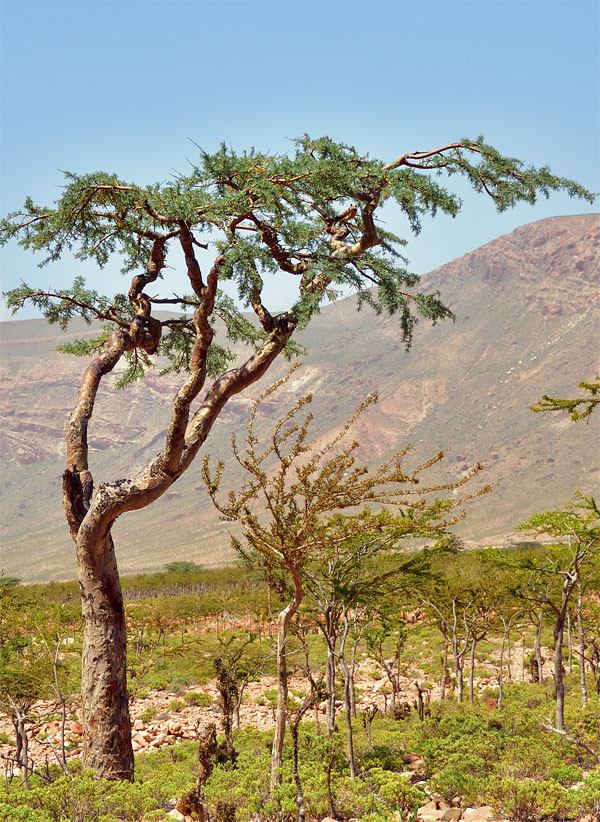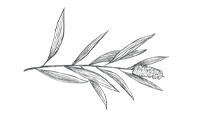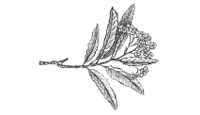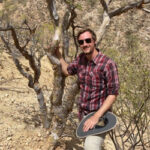Frankincense is one of the most complex aromatics, with a rich history, diverse chemistry, and complicated, unique harvesting systems.
Of the 24 species, 9 species are heavily traded on the international market as a source of essential oil, CO2 extracts, and hydrosols. The nine Boswellia species are B. carteri, B. dalzielii, B. frereana, B. neglecta, B. occulta, B. papyrifera, B. rivae, B. sacra*, and B. serrata.
Each species produces a unique resin and faces a different conservation outlook, and with the intricacies of these supply chains, it can seem overwhelming to try to ethically source frankincense resin and extracts. However, by understanding more about these species, how their resins are harvested, and making sure suppliers are supporting fair, equitable, and sustainable supply chains, it is possible to ensure a vibrant future for the frankincense trees and the communities that rely upon them.

Airmid Institute is excited about their collaboration with artist Lucas Anderson, whose artwork is inspired through essential oils, essential oil bearing-plants, and those Indigenous communities with direct links to them. Over the course of 2025-26, Lucas will be creating paintings – one for each nine frankincense species – which will wholly encompass their unique attributes while honoring traditional harvesting methods that have been used for thousands of years.
Airmid’s website will display a painting every time Lucas completes one, and to accompany it, we will provide additional information about the species and ways to ethically source it. We will also explore a possibility of an art exhibit in Los Angeles, CA to highlight this important work, and other pieces created by Lucas that are focused on fragile medicinal and aromatic plant species.
Paper prints, canvas prints, and art cards of the nine original paintings will be sold through Lucas Anderson who will donate 50% of proceeds to Airmid Institute. These funds will be used to support initiatives and education that help to strengthen the frankincense supply chain.
*The prevailing opinion among some experts is that there is a single, variable species called B. sacra. Still, genetic studies need to be conducted to definitively determine their status, and it is suggested to maintain the use of different names since B. sacra and B. carteri denote specific expectations of the origins of their oils, chemistry and fragrance profile (Johnson and Ablard, 2020).

The Art Work
Boswellia rivae
Ethiopia, Somalia, and Kenya
Boswellia rivae is locally known as Mirafur and is recognized for its diverse therapeutic properties. Its major chemical constituents include α-pinene, β-pinene, δ-3-carene, and limonene, contributing to its antimicrobial, anti-inflammatory, analgesic, chondroprotective, gastroprotective, anxiolytic, anti-acetylcholinesterase…
Boswellia dalzielii
Burkina Faso, Mali, and Nigeria
Boswellia dalzielii, native to Burkina Faso, Mali, and Nigeria, is traditionally known as Janawhi or Cricognimu. Its essential oil contains major constituents such as α-pinene, myrcene, limonene, and δ-thujene, contributing to its antimicrobial, anti-inflammatory, analgesic, and vulnerary properties. The oil has a fresh…
Boswellia sacra
Oman and Yemen
Boswellia sacra, native to Oman and Yemen, is locally known as Hoojri, Najdi, Shathari, and Shaabi. It is recognized for its rich therapeutic properties, primarily attributed to its major chemical constituents, including α-pinene, myrcene, sabinene, limonene, and δ-3-carene. Additionally, some B. sacra populations exhibit…
Boswellia neglecta
Ethiopia, Kenya, and Somalia
Boswellia neglecta, native to Ethiopia, Kenya, and Somalia, is locally known as Borena Type Olibanum (Ethiopia) and Dakkara (Kenya). It is distinguished for its diverse therapeutic properties, primarily attributed to its major chemical constituents, including α-pinene, α-thujene, terpinen-4-ol, and p-cymene…

Lucas Anderson
Artist
 Lucas is a Registered Aromatherapist (RA®) and Essential Oil Therapist (EOT®), brings seven years of experience in aromatherapy and a strong focus on men’s health and empowerment. With a deep passion for health as close to nature as possible, Lucas works with an extensive collection of over 130 essential oils. In addition to his expertise, Lucas has embarked on a unique artistic venture, creating paintings that represent each essential oil. With seven paintings already completed, he envisions capturing the essence of every oil in his collection through his artwork. Based in Edmonton, Canada, Lucas has previously served as the President of the CFA (Canadian Federation of Aromatherapists) and currently contributes to the CAOA (Canadian Alliance of Aromatherapy) as Vice President of the Board of Directors. Explore his oil-inspired paintings at his website.
Lucas is a Registered Aromatherapist (RA®) and Essential Oil Therapist (EOT®), brings seven years of experience in aromatherapy and a strong focus on men’s health and empowerment. With a deep passion for health as close to nature as possible, Lucas works with an extensive collection of over 130 essential oils. In addition to his expertise, Lucas has embarked on a unique artistic venture, creating paintings that represent each essential oil. With seven paintings already completed, he envisions capturing the essence of every oil in his collection through his artwork. Based in Edmonton, Canada, Lucas has previously served as the President of the CFA (Canadian Federation of Aromatherapists) and currently contributes to the CAOA (Canadian Alliance of Aromatherapy) as Vice President of the Board of Directors. Explore his oil-inspired paintings at his website.

Stephen Johnson
FairSource Botanicals
 Airmid Institute is deeply thankful to Stephen Johnson, Founder of FairSource Botanicals, for his generous donation of ethically sourced oils representing each frankincense species in this project. Stephen has been dedicated to the sustainability of wild-harvested products since 2016, conducting extensive field research and analysis in regions such as West Africa (Burkina Faso, Ghana), East Africa (Ethiopia, Somaliland, Puntland), and the Arabian Peninsula (Oman). His work has led to the publication of nearly a dozen peer-reviewed papers, book chapters, and reports focusing on non-timber forest products, especially frankincense.
Airmid Institute is deeply thankful to Stephen Johnson, Founder of FairSource Botanicals, for his generous donation of ethically sourced oils representing each frankincense species in this project. Stephen has been dedicated to the sustainability of wild-harvested products since 2016, conducting extensive field research and analysis in regions such as West Africa (Burkina Faso, Ghana), East Africa (Ethiopia, Somaliland, Puntland), and the Arabian Peninsula (Oman). His work has led to the publication of nearly a dozen peer-reviewed papers, book chapters, and reports focusing on non-timber forest products, especially frankincense.
Founded in 2019, FairSource Botanicals was built on the principle that sourcing and using botanicals should benefit both plants and people. They believe plants should be harvested sustainably and respectfully, harvesters should receive fair and timely compensation, and harvesting communities should have access to development opportunities. Additionally, they are committed to providing consumers with pure, high-quality, and traceable products.
FairSource Botanicals approaches this mission in two main ways: by supporting and enhancing existing ethical supply chains and pioneering new methods within established ones. Looking beyond sustainability, they are dedicated to creating regenerative supply chains that actively improve the health of ecosystems and plant populations involved. As a supplier of frankincense, myrrh, and other wild-harvested botanicals, Stephen not only promotes regenerative practices but also celebrates the rich diversity in scent, chemistry, and ecology among the various species of frankincense and myrrh.






